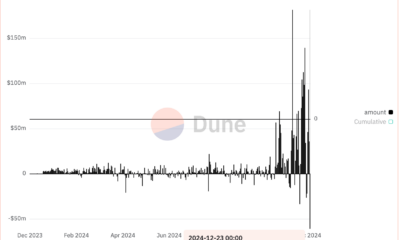Opinion
Bitcoin Vaults and the Future of Bitcoin Custody
Published
3 months agoon
By
admin
Bitcoin, the original cryptocurrency, has come a long way from its informal past. From an experimental digital currency that occupied cypherpunk niches on the internet, it has grown to a trillion-dollar market cap asset valued at over $66,900 per coin as of this writing.
While investing in Bitcoin is still considered a wild ride, the asset is quickly maturing. Financial institutions are closing in and creating hybrid vehicles to invest in cryptocurrency. The ecosystem reached a new milestone with the advent of Bitcoin ETFs, making people realize the immensity of Bitcoin’s potential in traditional markets and spurring new demand.
As more people and institutions invest in Bitcoin, Bitcoin vaults become more crucial. Here, we examine the features and importance of Bitcoin vaults and how they contribute to ensuring a reliable infrastructure that promotes sustained value and investability.
We explore their role in professionalized and institutional custody. Secure custodians are vital to protecting digital assets from theft and loss. This article also tracks the fast-advancing technology of Bitcoin vaults and how it relates to future developments in the custody space.
What are Bitcoin vaults, and how do they work?
Bitcoin vaults are offline digital asset storage solutions offering enhanced protection against online threats. This protection is created through multiple security layers.
As the Bitcoin investment sphere grows, new products are being created. Bitcoin vaults are a critical component of these new financial products. While hot wallets and exchange accounts offer easy transaction access, they are vulnerable to hacks.
Bitcoin vaults are fortified digital safes. They protect your Bitcoin by taking it offline and shielding it from the constant openness to online attacks. Their multiple layers of security include withdrawal delays, multi-signature or multisig authentication, and cold storage solutions.
One highly secure approach to Bitcoin or crypto vaults is called air-gapping. Air-gapped storage offers robust protection against malware attacks, phishing scams, and unauthorized access.
Many Bitcoin vaults integrate advanced encryption techniques. They typically require multiple authorizations for transactions to proceed. Advanced encryption and the need for layered authorization steps bolster security posture.
As a Bitcoin investor, ensuring that your coins are kept in air-gapped and layered security vaults protects your investment and helps you hold it long-term.
Vaults: Vital Components of Bitcoin Custody
Bitcoin vaults are a component of Bitcoin custody solutions. Bitcoin custody is the entire process of holding and securing BTC.
Because Bitcoin is a digital asset, it requires unique storage solutions to protect it from theft and loss. As BTC’s value rises, so does the interest from cybercriminals and hackers. Therefore, secure custody solutions are essential for protecting these digital assets.
The Advanced Technology Behind Bitcoin Vaults
The following advanced technologies combine to create the security behind Bitcoin vaults. Understanding them helps you understand, evaluate, and appreciate their robustness.
Cold Storage
Cold storage is a security method that keeps Bitcoin offline or away from internet-connected devices. Being offline reduces the risk of cyberattacks. Bitcoin cold storage is often used with multi-sig technology to provide maximum security.
Multi-Signature Technology
Multi-signature or multisig technology requires multiple private keys to authorize a Bitcoin transaction. This method implies that even as one key is compromised, the Bitcoin in the wallet cannot be transferred. The transaction still requires the other keys to be approved.
Multisig technology enhances security by distributing ownership and control over Bitcoin. It makes it very challenging for a single entity to access or steal the assets.
Hardware Security Modules (HSMs)
Hardware Security Modules (HSMs) are tamper-resistant and hardened devices that secure cryptographic processes. They generate, protect, and manage keys used for data encryption and decryption, as well as digital certificates and signatures.
These specialized devices, in other words, are designed to protect and manage your digital keys. They provide a secure environment for cryptographic key generation, storage, and usage, ensuring that the private keys are never exposed to potential threats. HSMs are often used in Bitcoin vaults to enhance the security of the stored assets.
HSMs are recommended for those with significant BTC holdings. They are also ideal for businesses handling Bitcoin and other crypto. While integration can be complex and require continued maintenance, the security benefits far outweigh the cost for those with high-value holdings.
Furthermore, HSMS are tested, validated, and certified to the highest standards. They enable organizations to meet and exceed emerging and established regulatory requirements for cybersecurity.
Companies Offering BTC Custody Solutions
As Bitcoin and its related financial products gain popularity, so does the need for reliable custody. Companies that offer this service are called Bitcoin or crypto custodians and are a critical component of the digital asset industry.
These companies or platforms offer secure BTC and crypto storage and provide services such as private key management, online security solutions, and transaction processing.
Crypto custodians are gaining prominence as the cryptocurrency market grows. They are essential in ensuring that assets are stored and managed securely. Moreover, they protect investors’ funds by providing layers of security beyond what public wallets or exchanges offer.
However, it must be noted that exchanges, trading desks, and investment platforms run their own custody solutions. In addition, some exchanges are also the most noted custody providers. Examples of top custody providers, most of which offer investment access, include Swan Bitcoin, BitGo, Coinbase Custody, Anchorage, Gemini Custody, Bakkt, and Bitcoin Suisse.
How To Choose Among BTC Custody Providers
Several companies are competing in the crypto custody market. If you are a regular BTC trader or investor, you might be curious about how to choose what works for you.
Platforms should enable users to buy and store Bitcoin easily. While popular exchanges like Binance and Kraken offer a wide range of services, including retail buying and selling of crypto, they have downsides. They may not provide the best storage options for your crypto, and they may be more vulnerable and open to various hacks.
Long-term BTC investors usually shun day trading and prefer the buy-and-hold strategy. Swan Bitcoin is a low-fee platform specializing in BTC-specific investments. It offers a full suite of BTC financial services, including Swan Vault, simplifying BTC storage for users. If you’re curious how it compares to large global exchanges, check out the Kraken review on Swan Bitcoin’s site.
The best Bitcoin vaults give you complete control over your coins, with user-friendly and straightforward features for setup, deposits, and withdrawals. They use the most reliable hardware to provide users with the most robust security. An example of such hardware is the Blockstream Jade signing device, a hardware wallet used by Swan Bitcoin to ensure BTC owners’ full access to keys offline.
You need signing devices that store two private keys to unlock a Swan Vault. Swan manages a third key called the Cloud Key, which is recommended for use as a second key to prevent bringing both hardware signing devices to the same location.
Bitcoin vaults must have sound recovery strategies for BTC theft or loss, as 72-hour holds for Cloud Key withdrawals. Moreover, these vaults need to offer comprehensive support services, including secure storage of spare keys to assist you in moving funds and customer support manned by trained specialists.
When Investing in BTC, Choose a Reliable Custodian
Bitcoin vaults are becoming increasingly important as more people and institutions invest in Bitcoin. As digital assets gain legitimacy through legalized financial products, security custody solutions become increasingly vital to protect them from theft and loss.
By leveraging advanced technologies such as multi-signature authentication, cold storage, and Hardware Security Modules, Bitcoin vaults provide a robust security solution for digital assets. In addition, multi-layered features ensure secure storage of private keys and means of recovery in case keys are lost or stolen.
Bitcoin vaults are not just meant to store BTC securely. They form the bedrock of the asset’s long-term viability as an investment vehicle.
It is not enough to leave the knowledge to technical experts or institutions. By understanding the importance of secure Bitcoin storage and the advancements in custody solutions, investors can make better-informed decisions about safeguarding their digital assets.
This is a guest post by Ivan Serrano. Opinions expressed are entirely their own and do not necessarily reflect those of BTC Inc or Bitcoin Magazine.
Source link
You may like


Here’s why Stellar Price Could Go Parabolic Soon


Perp-Focused HyperLiquid Experiences Record $60M in USDC Net Outflows


Experts say these 3 altcoins will rally 3,000% soon, and XRP isn’t one of them


Robert Kiyosaki Hints At Economic Depression Ahead, What It Means For BTC?


BNB Steadies Above Support: Will Bullish Momentum Return?


Metaplanet makes largest Bitcoin bet, acquires nearly 620 BTC



Recently, BlackRock released an educational video explaining Bitcoin, which I thought was great—it’s amazing to see Bitcoin being discussed on such a massive platform. But, of course, Bitcoin X (Twitter) had a meltdown over one specific line in the video: “There is no guarantee that Bitcoin’s 21 million supply cap will not be changed.”
HealthRnager from Natural News claimed, “Bitcoin has become far too centralized, and now the wrong people largely control its algorithms. They are TELLING you in advance what they plan to do.”
Now, let me be clear: this is total nonsense. The controversy is overhyped, and the idea that BlackRock would—or even could—change bitcoin’s supply is laughable. The statement in their video is technically true, but it’s just a legal disclaimer. It doesn’t mean BlackRock is plotting to inflate bitcoin’s supply. And even if they were, they don’t have the power to pull it off.
Bitcoin’s 21 million cap is fundamental—it’s not up for debate. The entire Bitcoin ecosystem—miners, developers, and nodes—operates on this core principle. Without it, Bitcoin wouldn’t be Bitcoin. And while BlackRock is a financial giant and holds over 500,000 Bitcoin for its ETF, its influence over Bitcoin is practically nonexistent.
Bitcoin is a proof-of-work (PoW) system, not a proof-of-stake (PoS) system. It doesn’t matter how much bitcoin BlackRock owns; economic nodes hold the real power.
Let’s play devil’s advocate for a second. Say BlackRock tries to propose a protocol change to increase bitcoin’s supply. What happens? The vast network of nodes would simply reject it. Bitcoin’s history proves this. Remember Roger Ver and the Bitcoin Cash fork? He had significant influence and holdings, yet his version of bitcoin became irrelevant because the majority of economic actors didn’t follow him.
If Bitcoin could be controlled by a single entity like BlackRock, it would’ve failed a long time ago. The U.S. government, with its endless money printer, could easily acquire 10% of the supply if that’s all it took to control Bitcoin. But that’s not how Bitcoin works. Its decentralized nature ensures no single entity—no matter how powerful—can dictate its terms.
So, stop worrying about BlackRock “changing” Bitcoin. Their influence has hard limits. Even if they tried to push developers to change the protocol, nodes would reject it. Bitcoin’s decentralization is its greatest strength, and no one—not BlackRock, not Michael Saylor—can change that.
This article is a Take. Opinions expressed are entirely the author’s and do not necessarily reflect those of BTC Inc or Bitcoin Magazine.
Source link
Opinion
It’s Time to Admit It – There Are Only 2.1 Quadrillion Bitcoins
Published
2 days agoon
December 21, 2024By
admin
If the above statement offends you, you might not have read the Bitcoin source code.

https://x.com/pete_rizzo_/
Of course, I’m sure you’ve heard that there are 21 million bitcoin – and this is true, the Bitcoin protocol allows for only “21 million bitcoin” to be created, yet these larger denominations can be subdivided into 100 million sub-units each.
Call them whatever you want, there are only 2.1 quadrillion monetary units in the protocol.
This dollars and cents differential has long been the subject of debate – in the time of Satoshi, Bitcoin’s creator, the dual conventions, Bitcoin having both a bulk denomination, and a smaller unit, was not much of a concern. There were questions about whether the software would work at all, and bitcoin were so worthless, selling them in bulk was the only rational option.
Rehashing this debate is BIP 21Q, a proposal to the Bitcoin users authored by John Carvalho, founder of Synonym, creator of the Pubky social media platform, and a tenured contributor whose work dates back to the days of the influential Bitcoin-assets collective.
In short, the BIP proposes that network actors – the various wallets and exchanges – change how Bitcoin denominations are displayed, with the smallest unit of the protocol renamed “bitcoins,” as opposed to “satoshis,” as they have been commonly called.
Here are the specifics of the BIP:
Redefinition of the Unit:
- Internally, the smallest indivisible unit remains unchanged.
- Historically, 1 BTC = 100,000,000 base units. Under this proposal, “1 bitcoin” equals that smallest unit.
- What was previously referred to as “1 BTC” now corresponds to 100 million bitcoins under the new definition.
Terminology:
- The informal terms “satoshi” or “sat” are deprecated.
- All references, interfaces, and documentation SHOULD refer to the base integer unit simply as “bitcoin.”
Display and Formatting:
- Applications SHOULD present values as whole integers without decimals.
- Example:
- Old display: 0.00010000 BTC
- New display: 10000 BTC (or ₿10000)
Unsurprisingly, the debate around the BIP has been hostile. For one, it’s not a technical BIP, though this is not a requirement of the BIP process. Suffice to say, it’s perhaps the most general BIP that has been proposed under the BIP process to date, as it mainly deals with market conventions and user onboarding logic, not any changes to the software rules.
However, I have to say, I find the proposal compelling. Nik Hoffman, our News Editor, does not, preferring to stick to the market affirmative.
Yet, I think the proposal raises relevant questions: why should new users be forced to compute their Bitcoin balances using only decimals? Surely this has the adverse side effect of making commerce difficult – it’s simply antithetical to how people think and act today.
Also, in terms of savings, at an $100,000 BTC price, it isn’t exactly compelling to think you could be spending a whole year earning 1 BTC, though that may be.
Indeed, there have been various debates for all kinds of units – mBTC, uBTC – that play around with the dollars and cents convention, but Carvalho here is wisely skipping to the end, preferring just to rip the band-aid off. $1 would buy 1,000 bitcoins under his proposal.
What’s to like here, and I argued this during a Lugano debate on the topic in 2023, is that it keeps both the larger BTC denomination and the smaller unit, now bitcoins. They are both important, and serve different functions.
My argument then was that having a larger denomination like BTC (100 million bitcoins) is important. If there was no “BTC unit,” the press and financial media would be faced to reckon that “1 bitcoin” is still worth less than 1 cent.
How much mainstream coverage and interest do we think there would be? I’d bet not very much.
In this way, BIP 21Q is a best-of-both-worlds approach.
The financial world, press, and media can continue championing the meteoric rise in value of “BTC,” while everyday users can get rid of decimals and complex calculations, trading the only real Bitcoin unit guaranteed to exist in perpetuity.
This article is a Take. Opinions expressed are entirely the author’s and do not necessarily reflect those of BTC Inc or Bitcoin Magazine.
Source link
Bitcoin spot ETF
We Need In-Kind Redemptions For The Spot Bitcoin ETFs
Published
2 days agoon
December 21, 2024By
admin


On a recent episode of the Coinage podcast, guest SEC Commissioner Hester Peirce said that she is open to reconsidering in-kind redemptions for spot bitcoin ETFs.
(For those who aren’t familiar with the term “in-kind redemption,” it refers to the ability to withdraw the bitcoin you’ve purchased via an ETF into your own custody. In essence, it turns a bitcoin IOU into the real thing.)
BREAKING: SEC Commissioner Hester Peirce previews new pro-crypto changes coming to the SEC
ETF in-kind redemptions and ability for ETF issuers to begin staking likely done "early on"
Both ETFs now have more than $100B in AUM pic.twitter.com/g3jtbuBeWU
— Coinage (@coinage_media) December 20, 2024
This makes my heart happy, as bitcoin wasn’t designed to exist trapped within the wrappers of the old system. It was built to set us free from that system.
If Peirce can work with the incoming SEC Chair, Paul Atkins, to facilitate the approval of in-kind redemptions then the spot bitcoin ETFs can serve as some of the biggest on-ramps to Bitcoin, as Bitwise co-founder Hong Kim put it, as opposed to simply existing as speculation vehicles.
Bitcoin was born to exist in the wild. It wasn’t born to exist in a Wall Street zoo.
In-kind redemptions would allow the bitcoin currently trapped within the zoo the ability to return to its natural habitat.
This article is a Take. Opinions expressed are entirely the author’s and do not necessarily reflect those of BTC Inc or Bitcoin Magazine.
Source link

Here’s why Stellar Price Could Go Parabolic Soon

Perp-Focused HyperLiquid Experiences Record $60M in USDC Net Outflows

Experts say these 3 altcoins will rally 3,000% soon, and XRP isn’t one of them

Robert Kiyosaki Hints At Economic Depression Ahead, What It Means For BTC?

BNB Steadies Above Support: Will Bullish Momentum Return?

Metaplanet makes largest Bitcoin bet, acquires nearly 620 BTC

Tron’s Justin Sun Offloads 50% ETH Holdings, Ethereum Price Crash Imminent?

Investors bet on this $0.0013 token destined to leave Cardano and Shiba Inu behind

End of Altcoin Season? Glassnode Co-Founders Warn Alts in Danger of Lagging Behind After Last Week’s Correction

Can Pi Network Price Triple Before 2024 Ends?

XRP’s $5, $10 goals are trending, but this altcoin with 7,400% potential takes the spotlight

CryptoQuant Hails Binance Reserve Amid High Leverage Trading

Trump Picks Bo Hines to Lead Presidential Crypto Council

The introduction of Hydra could see Cardano surpass Ethereum with 100,000 TPS

Top 4 Altcoins to Hold Before 2025 Alt Season
182267361726451435

Why Did Trump Change His Mind on Bitcoin?

Top Crypto News Headlines of The Week

New U.S. president must bring clarity to crypto regulation, analyst says

Will XRP Price Defend $0.5 Support If SEC Decides to Appeal?

Bitcoin Open-Source Development Takes The Stage In Nashville

Ethereum, Solana touch key levels as Bitcoin spikes

Bitcoin 20% Surge In 3 Weeks Teases Record-Breaking Potential

Ethereum Crash A Buying Opportunity? This Whale Thinks So

Shiba Inu Price Slips 4% as 3500% Burn Rate Surge Fails to Halt Correction

Washington financial watchdog warns of scam involving fake crypto ‘professors’

‘Hamster Kombat’ Airdrop Delayed as Pre-Market Trading for Telegram Game Expands

Citigroup Executive Steps Down To Explore Crypto
Mostbet Güvenilir Mi – Casino Bonus 2024

NoOnes Bitcoin Philosophy: Everyone Eats
Trending

 3 months ago
3 months ago182267361726451435

 Donald Trump5 months ago
Donald Trump5 months agoWhy Did Trump Change His Mind on Bitcoin?

 24/7 Cryptocurrency News4 months ago
24/7 Cryptocurrency News4 months agoTop Crypto News Headlines of The Week

 News4 months ago
News4 months agoNew U.S. president must bring clarity to crypto regulation, analyst says

 Price analysis4 months ago
Price analysis4 months agoWill XRP Price Defend $0.5 Support If SEC Decides to Appeal?

 Opinion5 months ago
Opinion5 months agoBitcoin Open-Source Development Takes The Stage In Nashville

 Bitcoin5 months ago
Bitcoin5 months agoEthereum, Solana touch key levels as Bitcoin spikes

 Bitcoin5 months ago
Bitcoin5 months agoBitcoin 20% Surge In 3 Weeks Teases Record-Breaking Potential



